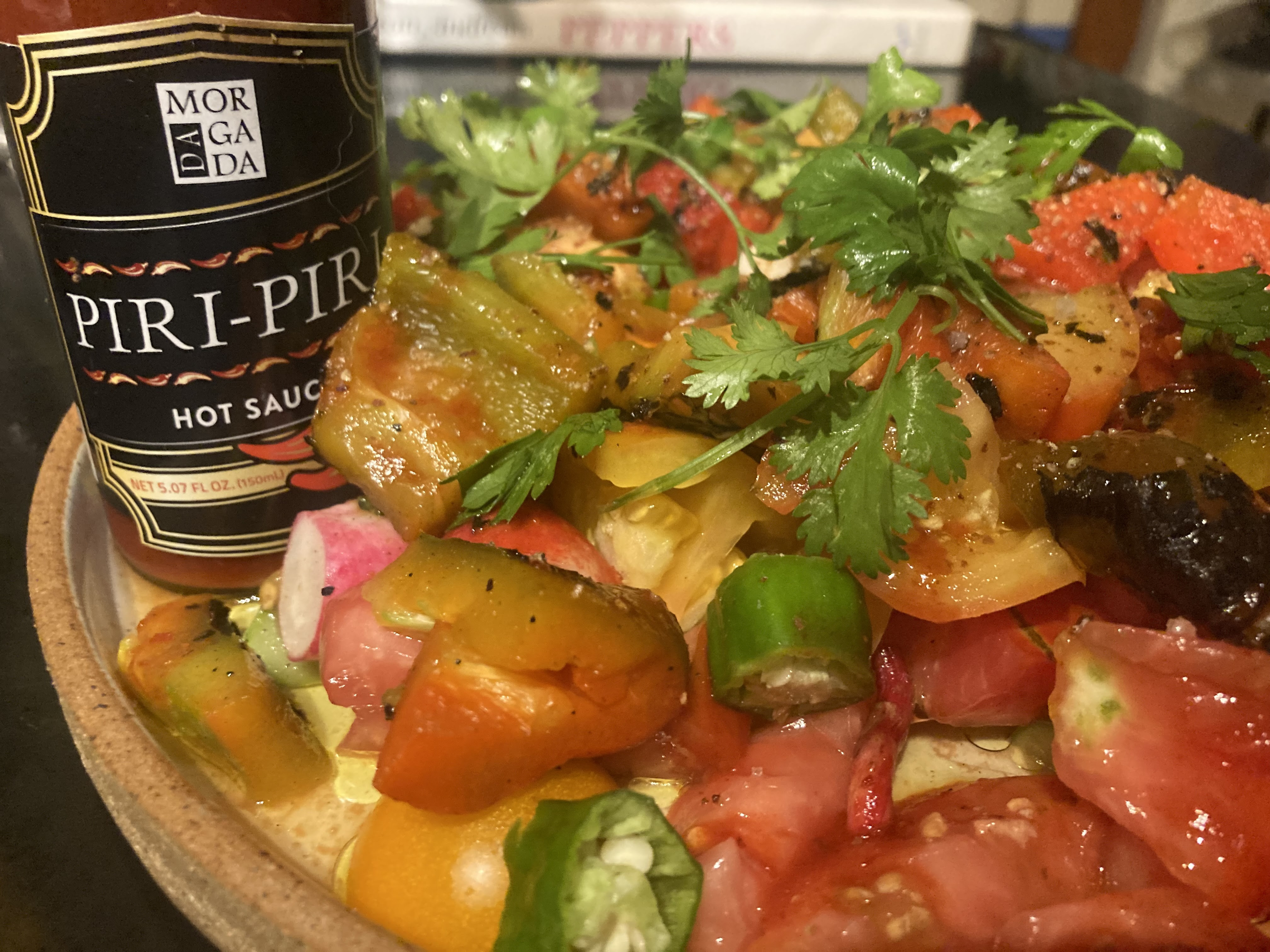Excerpt from Ari’s Top 5 enews
Tomatoes, peppers, and cucumbers dressed with Portugal’s spicy piri piri sauce
As I was thinking about good ways to take full advantage of some of the last of the heirloom tomatoes we’ll be getting around here this year, I remembered this salad that I learned many years ago from Jasper White, the New England chef who came to do a special dinner at the Roadhouse over a decade ago now. If you aren’t yet familiar with Piri Piri, put it on your list of spicy foods to sample sometime soon! It’s best known these days for marinating chicken, but in this dish it’s a key ingredient with fresh vegetables. We all know hot sauce as an accoutrement to be dashed onto dishes like gumbo, scrambled eggs, or tacos. Here it’s used to splash liberally on your salad!
I’ve long been fascinated with the Portuguese community in the U.S. While the Portuguese presence seems pretty low key to those of us living out here in the middle of the country, back in New England it’s pretty darned prominent. From a historical standpoint, there are all sorts of interesting theories about Portuguese explorers coming to North America before Columbus, possibly as early as 1487. The first documented Portuguese immigrant came in 1634. A lot of the early Portuguese were Converso Jews fleeing the Inquisition. Fifteen Portuguese-Jewish families arrived in Newport, Rhode Island in 1658, and the still-standing and pretty famous Touro Synagogue was dedicated in Newport in 1763. At the end of the 18th century, significant numbers of immigrants started arriving here from the Azores, the islands that lie about a thousand miles to the west, off the coast of Portugal. Many got into whaling, which allowed them to make a living and escape the extreme poverty that was prevalent in their home islands at the time. The big push of Portuguese immigration began in the 1890s, again primarily Azoreans. Nearly 200,000 came in the first two decades of the 20th century. A later wave came in the second half of the 20th century, and the communities continued to grow in Massachusetts and also in Rhode Island. Like every ethnic group that’s come here, Portuguese immigrants worked hard to recreate the dishes they knew from home, blending and adapting them based on the ingredients that they found in the U.S.
The Piri Piri salad is made with roasted green pepper, chunks of tomato, thickly sliced cucumbers, and a good dose of chopped fresh cilantro. (The cilantro is a key addition to the flavor, but if you’re not a fan, you can add fresh parsley perhaps.) It’s dressed with wine vinegar, olive oil, and the Portuguese Piri Piri sauce that we have at the Deli. In essence, it struck me as the Portuguese counterpart to a traditional Greek salad. I’m sure you could use any vegetable you like to eat in its raw state—I made mine the other day by adding some beautiful fresh radishes Tammie brought home. While it’s still relatively unfamiliar to most Americans, in Portugal Piri Piri is probably more popular even than Tabasco is in the U.S. It’s a legacy from the many years of Portuguese colonial activity in Africa; peppers came back from the Western Hemisphere to the Iberian peninsula and from there went down the west coast of Africa with the Portuguese to the Cape Verde islands and Angola. Pilipili means “pepper” in Swahili. It came to be made from what’s now known as “Birdseye peppers”—spicy and complex in flavor at the same time.
The peppers for this sauce are still grown south of the equator then brought up to Portugal where they’re blended with vinegar, salt, and spices. Piri Piri is pretty all-purpose—great on fish, eggs, chicken, pork, beans … You name it, really. It has a unique, fruity, spicy flavor that jazzes up most any dish. I love it! If you want to do up a really easy hors d’oeuvre, just drizzle a little onto toasted slices of baguette with Creamery cream cheese on top, or sprinkle it onto soup, stews, or just about anything else!
The Piri Piri salad is very simple to make. Cut the cucumbers into reasonably thick slices and salt them so that they can drain a bit before you toss them in the bowl. Roast the green peppers over an open flame until the skin is charred, then when they’ve cooled enough to handle, scrape off the char with a knife, then slice them into one-inch squares. Cut a couple ripe heirloom tomatoes into chunks. Sprinkle with wine vinegar, oil, plenty of Piri Piri, and a little salt and pepper. Aside from the important quality of the vegetables and the olive oil, the Piri Piri is the key to making this salad so special. Easy, and a really good accompaniment to most any main dish, but especially fish. In fact, in deference to the Portuguese preference for tinned fish, the salad would be good with some of the terrific canned sardines we have on hand. Almonds make a great addition as well!
Explore our other salad recipes here on the blog!





